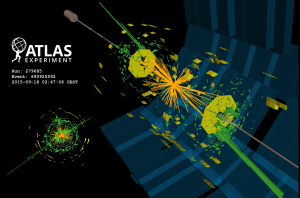ATLAS Experiment at CERN
Faculty
Our work at the LHC
The ATLAS detector is one of two large, multi-purpose experiments at the Large Hadron Collider (LHC) in CERN Switzerland. As the highest energy particle collider ever built (and arguably the largest scientific instrument ever constructed) the LHC provides a unique laboratory to explore the fundamental particles and forces that govern the universe. The discovery of the Higgs Boson by ATLAS and CMS in 2012 completed the so-called Standard Model of Particle Physics (SM), but we have many reasons to believe that this theory is incomplete, and there must be more to discover.
The research of the Oregon ATLAS group, funded by the U.S. Department of Energy’s Office of Science, focuses on searches for physics beyond the Standard Model. We are involved in searches for Supersymmetric extensions to the SM, including direct searches for stop production, along with long-lived particle searches. We also are involved in searches for new heavy gauge bosons coupling to the Higgs, searches for new particles in di-jet and di-top final states, and flavor-changing neutral current decays of the top quark.
The Oregon group plays a significant role in the operation, maintenance, and upgrade of the ATLAS detector. We have major responsibilities in the operation of the Trigger and Data Acquisition system, along with working in the area of Data Preparation (particularly Luminosity determination). We are working on upgrades to the calorimeter-based trigger system for both the Phase I and HL-LHC upgrades.
The research done by the Oregon group on ATLAS includes the participation of post-doctoral researches, Oregon graduate students, and undergraduate researchers. Many of our students and postdocs have the opportunity to live in the Geneva area and work in the international community of particle physicists at CERN.
This work is supported by the U.S. Department of Energy Office of Science (Office of High Energy Physics), awards DE-SC0017996 and DE-SC0020244.
More Information
- Around the O article: Professor Laura Jeanty Receives Five-Year DOE Early Career Award
- ATLAS Collaboration
- CERN
- Particle Adventure – more information about High Energy Physics, particularly for students
- U.S. ATLAS
